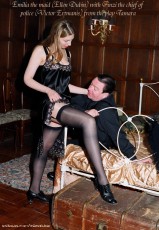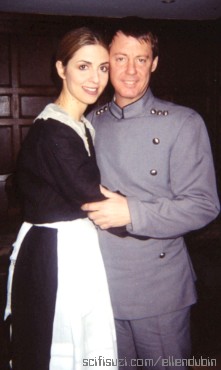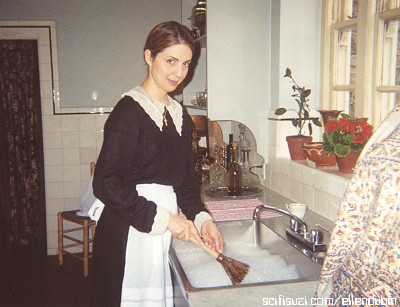|
+++
Photo from TAMARA

Click
on photo to view larger version
Photographer: Nir Bareket
+++

Ellen
Dubin as Emilia the maid and Dan Lett as Mario in
TAMARA
Photographer: Nir Bareket

Ellen
as Emilia the Italian maid in
TAMARA at the World Theater Festival.
Photographer: Nir Bareket
|
Ellen Dubin
Stars in TAMARA
Ellen is thrilled to
have
reprised her role as the passionate,
sensual maid, Emilia, in the World
Theatre Festivals' Production of the award winning,
critically acclaimed "Tamara" in
Toronto, Canada at Graydon Hall. This was an
extremely demanding role, both physically and emotionally for
Ellen. Her
character runs the gamut of emotions. This was a tour
de force part for Ellen and she relished every moment working
under the inspiring direction of Richard Rose.
There
is an unique experience for the audience to follow the
characters around in the house. It's short exclusive
ran from
April 3rd to April 16th, 2003. Poster
Artwork: Ellen
Dubin listed in an ad for "Tamara," Toronto Globe and
Mail
|

|
Critics
Reviews:
Tamara
is not just another play
Performance takes place in a mansion.
RICHARD
OUZOUNIAN
THEATRE CRITIC
Tamara
By John Krizanc. Directed by Richard Rose.
The secret is to keep moving.
If you decide to see Tamara, which opened Sunday night at Graydon
Hall Manor, you might be well advised (for the first act, anyway)
to do as I did and follow Ellen Dubin, who plays Emilia Pavese,
the kleptomanical housemaid of easy morals.
Boy, does she move!
I spent most of the show's first hour running up and down stairs,
dashing in and out of rooms, pushing past people and grasping for
bits of information.
That was the fun part.
But in Act II when I actually had to heed the plot, characters and
dialogue, it got a lot less interesting.
John Krizanc's play is a melodramatic concoction set in the Italy
of 1927 when Mussolini's fascists were solidifying their hold on
the country.
It focuses on poet Gabriele D'Annunzio and the kaleidoscope of
political and sexual intrigue that swirls around him.
But you don't go to Tamara for the story. You go for how it's
told. This living movie is set not in a theatre, but all over a
spacious mansion, and although every room is alive with activity
for most of the evening, you have to choose which of 10 characters
you're going to follow.
Consequently, there is no such thing as "a right way" to
see the show. Everyone is going to miss something, and that's just
how it goes. So should you see it?
Well, the strength of Tamara is in its clever concept and bravura
execution, courtesy of director Richard Rose, rather than in its
incredibly feeble script.
Krizanc writes here in three styles, none of them all that
admirable:
The epigrammatic: "Perhaps the house has gotten bigger.
Perhaps we've gotten smaller." Everybody starts to sound like
they're on a Fascist version of Gilmore Girls.
The self-analytical: "Rome! Venice! I don't care about you
men and your cities." Characters keep taking their own
temperatures as though they were in an unstaffed walk-in clinic.
The narrative: Lines such as, "As long as Finzi thinks Dante
doesn't know about Mario and me," are just as hard to follow
as they seem to be and there's an awful lot of them.
No matter how kinetic the staging is, a text like this eventually
slows to a leaden crawl.
The actors that I spent the most time with varied widely in
quality. Ellen Dubin as the housemaid was solidly and subtly in
character throughout, while Victor Ertmanis huffed and growled to
fine effect as a sinister fascist.
On the other hand, Roger McKeen grew dull rather quickly as the
faithful Dante and Dan Lett lacked the charm and sexual magnetism
necessary to play the chauffeur Mario.
I grew to wonder if the whole project suffered from a serious
internal flaw. When actors are going to be playing vital scenes
less than a foot away from you, it might be a better idea if they
were telling a subtle and delicate story, rather than a loud and
boisterous one.
As for the pros and cons of the experience, I've visited far less
impressive houses, but I've seen far more impressive plays. Additional
articles by Richard Ouzounian
++++++
Tamara
By John Krizanc. Directed by Richard Rose.Graydon Hall Manor,
Toronto
by ROBERT CUSHMAN
THE NATIONAL POST
World Stage's Canadian content
section kicks off with a revival of Tamara: officially a play by
John Krizanc, but better known as the "legendary
environmental theatre event" (the press release's precisely
accurate description) that effectively launched Richard Rose's
Necessary Angel company in 1981. Rose has now moved on to become
director of the Tarragon, so this is his full-circle farewell.
As everyone knows, the show unfolds before a limited audience in a
stately house: all over it, since the actors -- 10 of them -- keep
splitting up, moving off into different rooms in different
combinations, and we can decide which of them to follow. We become
-- not our own dramatists, exactly, since the script has been
written and we can't amend it -- but our own story editors. And of
course, with the action multiplying amoebically, however we
choose, we miss a lot. At the same time, we maintain the perverse
belief that the bits we saw were the most important ones.
The effect, however close we may get to the actors, is not to make
the event more real but to make it more artificial. For a start,
the house is standing in for the Italian mansion of Gabriele
d'Annunzio, poet and icon, in 1927. A possible but unpredictable
Fascist, d'Annunzio is being wooed by Mussolini to give legitimacy
to his regime. On this particular night, d'Annunzio awaits a visit
from the Polish artist Tamara de Lempicka, who is going to paint
him and whom he wants to seduce. (Given the slippery political
climate, a possible theme, for her picture or for the play itself,
might be D'Annunzio Denounced.) Others in residence are
d'Annunzio's housekeeper, a pianist who is also his former
mistress, an aspiring ballerina who wants his patronage, and an
all-purpose male artist. There is also a brutally mannered
policeman, keeping tabs for Il Duce. Below stairs, sometimes
literally, are a valet, a chauffeur and a maid. Both echelons may
contain spies, probably Communists. Two separate characters turn
out to be Jewish ex-gondoliers.
It's a magnificent gimmick. It's impossible not to be awed by the
production's logistics, by its sumptuous layout, and by its sheer
synchronicity. It's impossible, too, not to be tantalized by the
thought of what you might be missing (not to mention the screams,
gunshots and door-slams that always seem to be going on somewhere
else, and the vintage Rolls in waiting at the front door) and to
at least consider coming again and making other choices.
It's seldom given to an audience to stand in a kitchen and watch,
at close quarters, an actor preparing and then eating a frittata,
as John Gilbert's d'Annunzio does here. After he'd performed this
feat, I rather drifted away from the Commandante (as everybody
calls him), so, come the end of the piece, I was unsure what the
upshot of his story was, or why he was thought to be so important.
I realized I had seen even less of the title figure; indeed, I
wondered whether her status was some kind of joke on the theme of
hope and meaning deferred. (Tamara and Tamara and Tamara.) But no,
I'm sure she must have been existing like mad, even when out of my
sight. On the other hand, I remember spending more time with them
when, as a tourist, I saw the original production, and I didn't
find them all that compelling even then. I do recall that the
actor playing d'Annunzio was a lot closer to the dwarfish
historical figure than is the bluff, upstanding Gilbert, but
neither player was able to bring him to life
This time, while aiming to spread my favours as equally as
possible, I
ended up spending most time in the company of Victor Ertmanis'
Fascist cop, and of Ellen Dubin as the kind of maid whom everybody
ought to have and whom most, as far as I could tell, had. There
was much plotting and counter-plotting going on here, and a lot of
angry or ironic statements about the strange people whom politics
can, figuratively or otherwise, put you in bed with.
Yes, some surprising or just misguided people supported
Fascism. But this isn't news, and the play doesn't make it new.
When the show was first done, Rose and Krizanc announced that they
were commenting on Fascism by reducing the element of Fascism in
the theatrical experience itself -- i.e., by giving the audience
some choice. However, all of Rose's subsequent productions that
I've seen have had a perfectly orthodox relationship between show
and audience, so either he's dropped this dubious theory or he's
surrendered to Fascism himself. Krizanc, since writing Tamara, has
not had a very obtrusive theatrical career, but he has written for
film and television, in both of which, of course, the choosing is
done by the camera.
His writing here is melodramatic going on portentous. "I know
the difference between an artist and a whore," says
d'Annunzio. "A whore has better morals." The ballerina,
who has exhibited racist tendencies, is told: "You will never
be a modern dancer; you can move, but you're not free." The
style, or lack of it, affects the acting. The performers, with a
couple of exceptions, are very assured, but they're mostly engaged
in striking attitudes. This kind of intimate exposure is supposed,
theoretically, to lead to acting of rare truthfulness (it did a
couple of years ago in Paula and Karl), but here it's up-close and
impersonal.
Halfway through, and again at the end, the valet brings us all
back together to inquire solicitously as to how we're getting on.
At such moments, the show takes on a strong resemblance to
Mysteriously Yours, the whodunit dinner theatre, which is every
bit as interactive and usually better written. You get a full
meal, too, though Tamara does offer wine, both preparatory and
dessert, coffee and cake. I had fond memories of that cake from
the '81 production; in fact, I thought it was the artistic
highlight, not only of the production but of the entire
one-time-only Toronto Theatre festival, of which it formed a part.
In the intervening years, the standard of the patisserie has gone
down but the performance level has gone up. That's true not only
of Tamara but of the Canadian theatre in general. You have to hand
it to Tamara -- it must be the most successful play nobody has
ever seen.
Until April 13. Box office: 416-973-4000.; robertcushman@lycos.com
© Copyright 2003 National Post
Photographs of Ellen Dubin Copyright:
Wanstrom & Assoc.

|